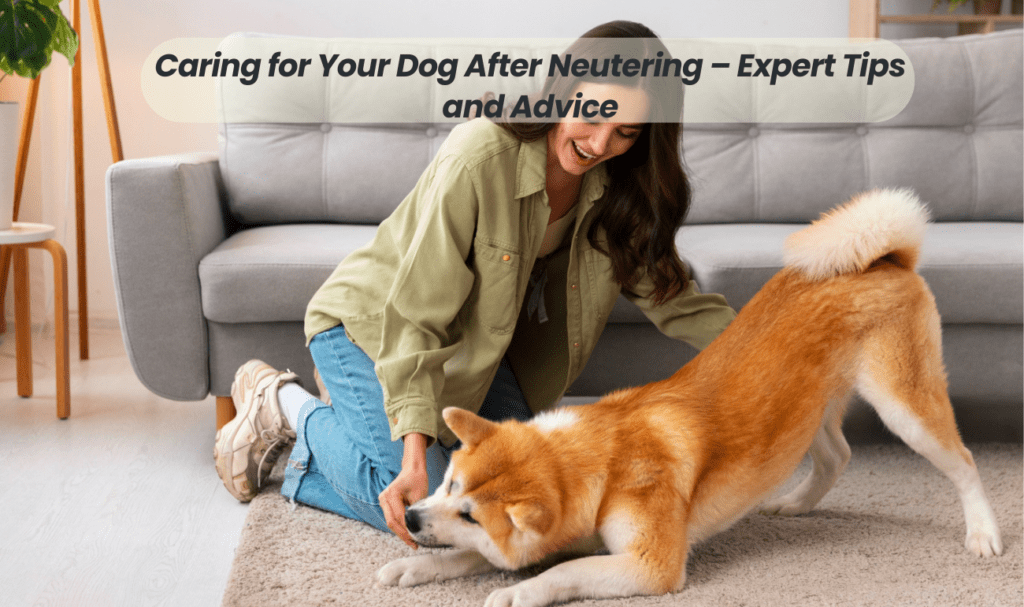Neutering, also known as spaying (for females) or castration (for males), is a surgical procedure performed by a veterinarian to remove the reproductive organs of a dog. This procedure is important for several reasons. Firstly, it helps control the pet population by preventing unwanted litters. Secondly, it can reduce behavior problems such as aggression and roaming. Lastly, neutering your dog can have significant health benefits, including a lower risk of certain cancers and infections.
- The benefits of neutering your dog
- What to expect after neutering your dog
- Post-neutering care tips for a smooth recovery
- Diet and nutrition recommendations after neutering
- Exercise and activity guidelines for a neutered dog
- Behavioral changes to expect after neutering
- Common concerns and how to address them
- Expert advice on post-neutering care for specific dog breeds
- Conclusion and final thoughts on caring for your dog after neutering
The benefits of neutering your dog
Neutering your dog offers numerous benefits that go beyond population control. For male dogs, castration can reduce the risk of testicular cancer and decrease the likelihood of territorial marking and aggression. Neutered males are also less likely to roam in search of a mate, minimizing the risk of accidents or getting lost. Female dogs, on the other hand, can benefit from spaying by eliminating the risk of uterine infections, reducing the chances of mammary tumors, and eliminating the inconvenience of heat cycles.
What to expect after neutering your dog
After neutering your dog, it is important to be prepared for the recovery process. Your dog may experience some discomfort and swelling around the surgical site. It is normal for them to be groggy and disoriented due to the anesthesia. Your veterinarian will provide you with guidelines on managing pain and monitoring the incision site. It is crucial to follow these instructions to ensure a smooth recovery.
Post-neutering care tips for a smooth recovery
To promote a smooth recovery after neutering, there are several essential care tips to keep in mind. Firstly, provide a quiet and comfortable space for your dog to rest. Limit their physical activity and avoid allowing them to jump or run excessively. Make sure to keep the incision site clean and dry, following any instructions given by your veterinarian. Prevent your dog from licking or chewing the incision by using an Elizabethan collar or a surgical suit. Monitor their appetite, bowel movements, and overall behavior to detect any potential complications early on.
Also Read : How to check dog blood sugar level
Diet and nutrition recommendations after neutering
Neutering can have an impact on your dog’s metabolism and hormonal balance, so it is important to adjust their diet accordingly. After the procedure, your dog may have a decreased appetite or a tendency to gain weight. To prevent obesity, switch to a high-quality, balanced dog food specifically formulated for neutered dogs. Monitor their calorie intake and consult with your veterinarian to determine the appropriate portion sizes. Additionally, ensure a constant supply of fresh water and consider incorporating joint supplements to support their overall health.
Exercise and activity guidelines for a neutered dog
While exercise is important for a dog’s physical and mental well-being, it is crucial to adjust the intensity and duration of their activities after neutering. During the recovery period, limit strenuous exercise and avoid activities that may put strain on the incision site. Instead, opt for short, controlled walks on a leash to prevent excessive pulling or jumping. Gradually increase the intensity and duration of exercise as your dog heals, always considering their comfort level. Regular exercise will help prevent weight gain and promote muscle tone, benefiting their overall health.
Behavioral changes to expect after neutering
Neutering can lead to certain behavioral changes in dogs. Male dogs may experience a decrease in aggression and territorial behavior. They are also less likely to roam or display mounting behavior. Female dogs may become calmer and less prone to mood swings associated with heat cycles. However, it is important to note that neutering is not a guaranteed solution to behavioral issues. Proper training and socialization are still essential to address any existing behavior problems and ensure a well-rounded, obedient companion.
Common concerns and how to address them
After neutering your dog, you may have some common concerns. It is normal to worry about the surgical incision, swelling, or signs of infection. If you notice any unusual symptoms such as excessive bleeding, discharge, or prolonged lethargy, contact your veterinarian immediately. They will be able to address your concerns and provide appropriate guidance. Remember to follow the post-operative care instructions diligently and maintain regular check-ups to monitor your dog’s progress.
Expert advice on post-neutering care for specific dog breeds
Different dog breeds may have specific needs and considerations when it comes to post-neutering care. Large breeds, for example, may require extra support to prevent joint issues. Smaller breeds may need additional protection from cold weather due to their decreased body fat. It is always beneficial to consult with a veterinarian who is familiar with your dog’s breed to ensure you are providing the best care possible.
Conclusion and final thoughts on caring for your dog after neutering
Caring for your dog after neutering is crucial for their overall well-being and a smooth recovery. By following the expert tips and advice provided in this guide, you can ensure that your dog’s post-neutering experience is as comfortable and stress-free as possible. Remember to consult with your veterinarian for personalized recommendations based on your dog’s specific needs. Neutering is an important responsibility as a pet owner, and by providing proper care, you are giving your furry friend the best chance at a healthy and happy life.

